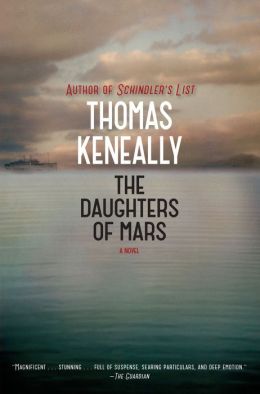
The sisters start out in Cairo and then are moved to a hospital "black ship" (a black out of all lights etc and the red cross gone) meaning it will be a hospital vessel once again once it drops troops at Gallipoli. But on their way there, the ship is torpedoed. This is a harrowing account. The ship is sinking and the girls as well as soldiers and fellow nurses cling to the remaining life boats. They hear "huge metal shrieks and thumps... within the ship and the unearthly lament of mules and ponies went on...A horse with bulging eyes came swimming up, the sort they might use to pull a canon." Keneally vividly describes the sinking ship: "Men still on the ship were now reduced to jumping from the stern or sliding down its curves. She saw two land in the churning propeller which cut them in sections and threw their blood about in a terrible mist so instant you could doubt it had happened." He also vividly describes the complacent air of those that simply moaned and let go of the raft to drift to the bottom of the sea.
The girls are sent to the Greek island of Lemnos and are treated not as Florence Nightingales but as sub par medical cleaning ladies and to sexual harassment and subjugation. As Naomi says, "They'll never be able to print the story of the sinking ship because we weren't hysterical enough." Even with the larger picture of the war looming, Keneally does offer a picture into the private lives of our sisters and their fellow nurses. He tries to show that even in these trying times there is a need for humanity and love. There are furtive kisses and fumbling, love gained and in war, love lost.
Keneally's primary sources for the novel were the wartime journals of the Australian nurses, unearthed in state archives. He also tried to add authenticity to his writing by writing in a style reminiscent of the time. He says in his Author's Note, "The punctuation used in this narrative might seem occasionally eccentric, but is designed to honor that of the forgotten private journals of the Great War, written by men and women who frequently favored dashed rather than commas." It does take awhile to get used to but once you're into the story, it becomes a part of the narrative. Everything in this novel, as the reveiwer from NPR says, "lives and breathes with marvelous intensity". As Naomi takes her sister by the chin and commands Sally, she says, "There are only two choices, you know. Either die or live well. We live on behalf of thousands who don't. Millions. So let's not mope about it, eh?"
Keneally plays with few literary effects except for the final chapter. There he offers us alternate postwar futures for the sisters. That I didn't like. For such a straightforward book about the bonds of sisterhood, the carnage of war, the simple determination to live or die just didn't seem right to me. The only thing I can think of is that wars are full of ambiguities and vagaries. What allowed some to live and others die?
No comments:
Post a Comment